Analysis of Legislation & Ethics in Travel & Tourism Sector Report
VerifiedAdded on 2020/12/09
|17
|5356
|145
Report
AI Summary
This report delves into the crucial aspects of legislation and ethics within the travel and tourism sector. It begins by exploring the legal and regulatory frameworks, including sources of UK law and specific acts like the Development of Tourism Act 1969 and the Health and Safety Act 2011, along with the roles of regulatory bodies such as SRA, IATA, ATOL, and ABTA. The report then examines measures to resolve client issues and evaluates the implications of health and safety, security, and equality legislations, including the Data Protection Act 1988 and the Human Rights Act 1998. Furthermore, it analyzes contract and consumer protection legislations, and identifies ethical dilemmas and CSR activities of large corporations in the sector, providing insights into innovative approaches to address these challenges. The report emphasizes the importance of ethical conduct and adherence to legal standards for the effective operation of businesses in the travel and tourism industry.
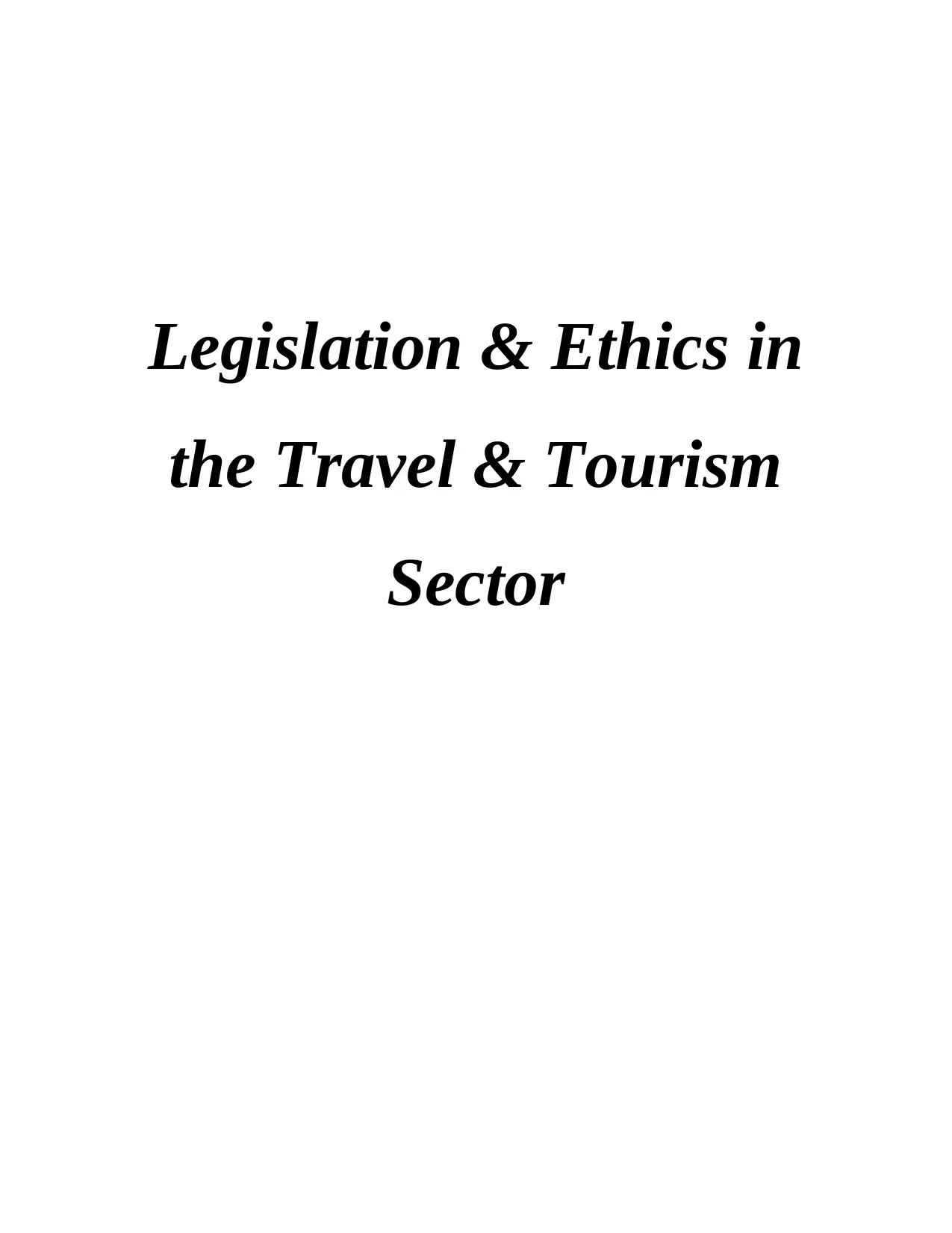
Legislation & Ethics in
the Travel & Tourism
Sector
the Travel & Tourism
Sector
Paraphrase This Document
Need a fresh take? Get an instant paraphrase of this document with our AI Paraphraser
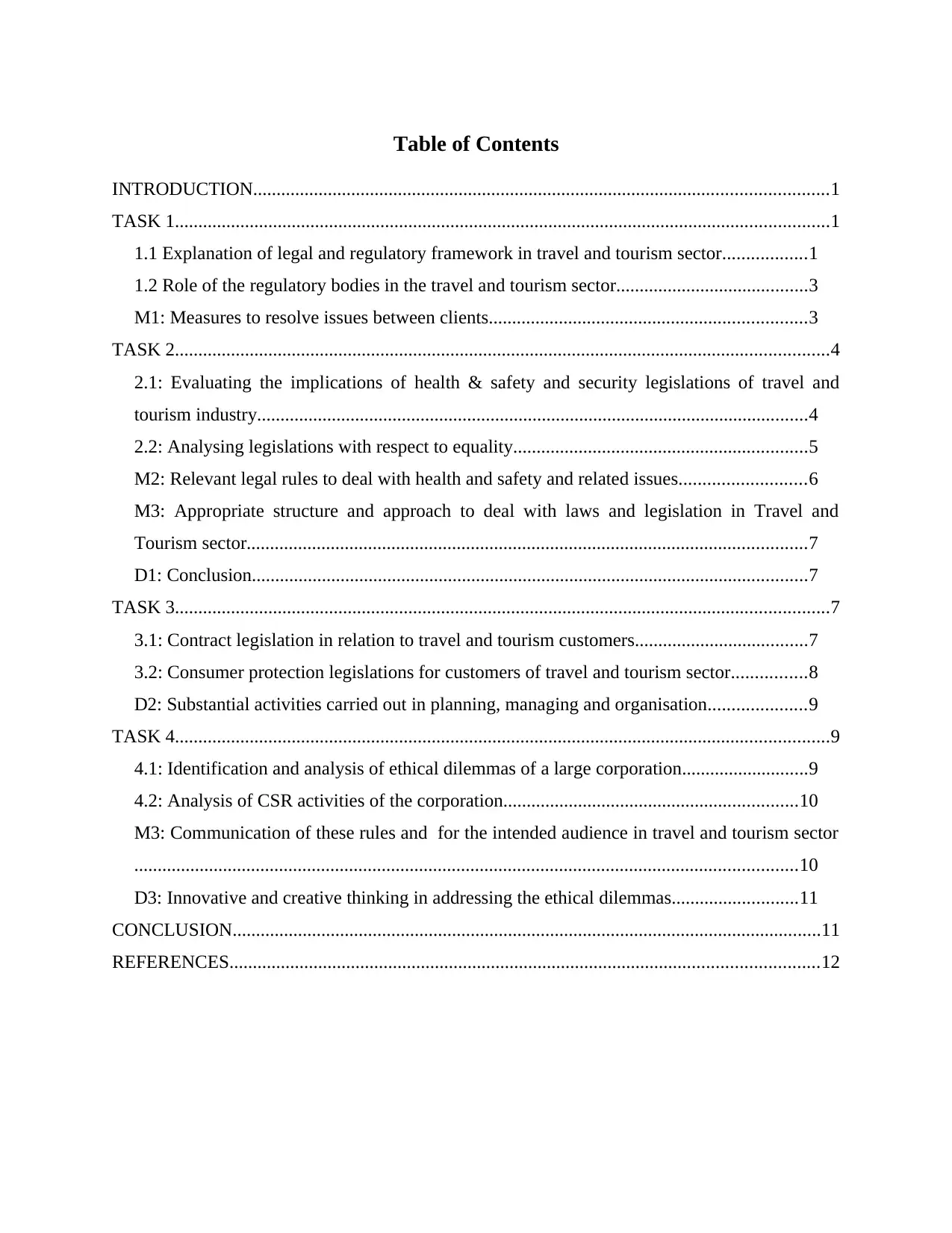
Table of Contents
INTRODUCTION...........................................................................................................................1
TASK 1............................................................................................................................................1
1.1 Explanation of legal and regulatory framework in travel and tourism sector..................1
1.2 Role of the regulatory bodies in the travel and tourism sector.........................................3
M1: Measures to resolve issues between clients....................................................................3
TASK 2............................................................................................................................................4
2.1: Evaluating the implications of health & safety and security legislations of travel and
tourism industry......................................................................................................................4
2.2: Analysing legislations with respect to equality...............................................................5
M2: Relevant legal rules to deal with health and safety and related issues...........................6
M3: Appropriate structure and approach to deal with laws and legislation in Travel and
Tourism sector........................................................................................................................7
D1: Conclusion.......................................................................................................................7
TASK 3............................................................................................................................................7
3.1: Contract legislation in relation to travel and tourism customers.....................................7
3.2: Consumer protection legislations for customers of travel and tourism sector................8
D2: Substantial activities carried out in planning, managing and organisation.....................9
TASK 4............................................................................................................................................9
4.1: Identification and analysis of ethical dilemmas of a large corporation...........................9
4.2: Analysis of CSR activities of the corporation...............................................................10
M3: Communication of these rules and for the intended audience in travel and tourism sector
..............................................................................................................................................10
D3: Innovative and creative thinking in addressing the ethical dilemmas...........................11
CONCLUSION..............................................................................................................................11
REFERENCES..............................................................................................................................12
INTRODUCTION...........................................................................................................................1
TASK 1............................................................................................................................................1
1.1 Explanation of legal and regulatory framework in travel and tourism sector..................1
1.2 Role of the regulatory bodies in the travel and tourism sector.........................................3
M1: Measures to resolve issues between clients....................................................................3
TASK 2............................................................................................................................................4
2.1: Evaluating the implications of health & safety and security legislations of travel and
tourism industry......................................................................................................................4
2.2: Analysing legislations with respect to equality...............................................................5
M2: Relevant legal rules to deal with health and safety and related issues...........................6
M3: Appropriate structure and approach to deal with laws and legislation in Travel and
Tourism sector........................................................................................................................7
D1: Conclusion.......................................................................................................................7
TASK 3............................................................................................................................................7
3.1: Contract legislation in relation to travel and tourism customers.....................................7
3.2: Consumer protection legislations for customers of travel and tourism sector................8
D2: Substantial activities carried out in planning, managing and organisation.....................9
TASK 4............................................................................................................................................9
4.1: Identification and analysis of ethical dilemmas of a large corporation...........................9
4.2: Analysis of CSR activities of the corporation...............................................................10
M3: Communication of these rules and for the intended audience in travel and tourism sector
..............................................................................................................................................10
D3: Innovative and creative thinking in addressing the ethical dilemmas...........................11
CONCLUSION..............................................................................................................................11
REFERENCES..............................................................................................................................12
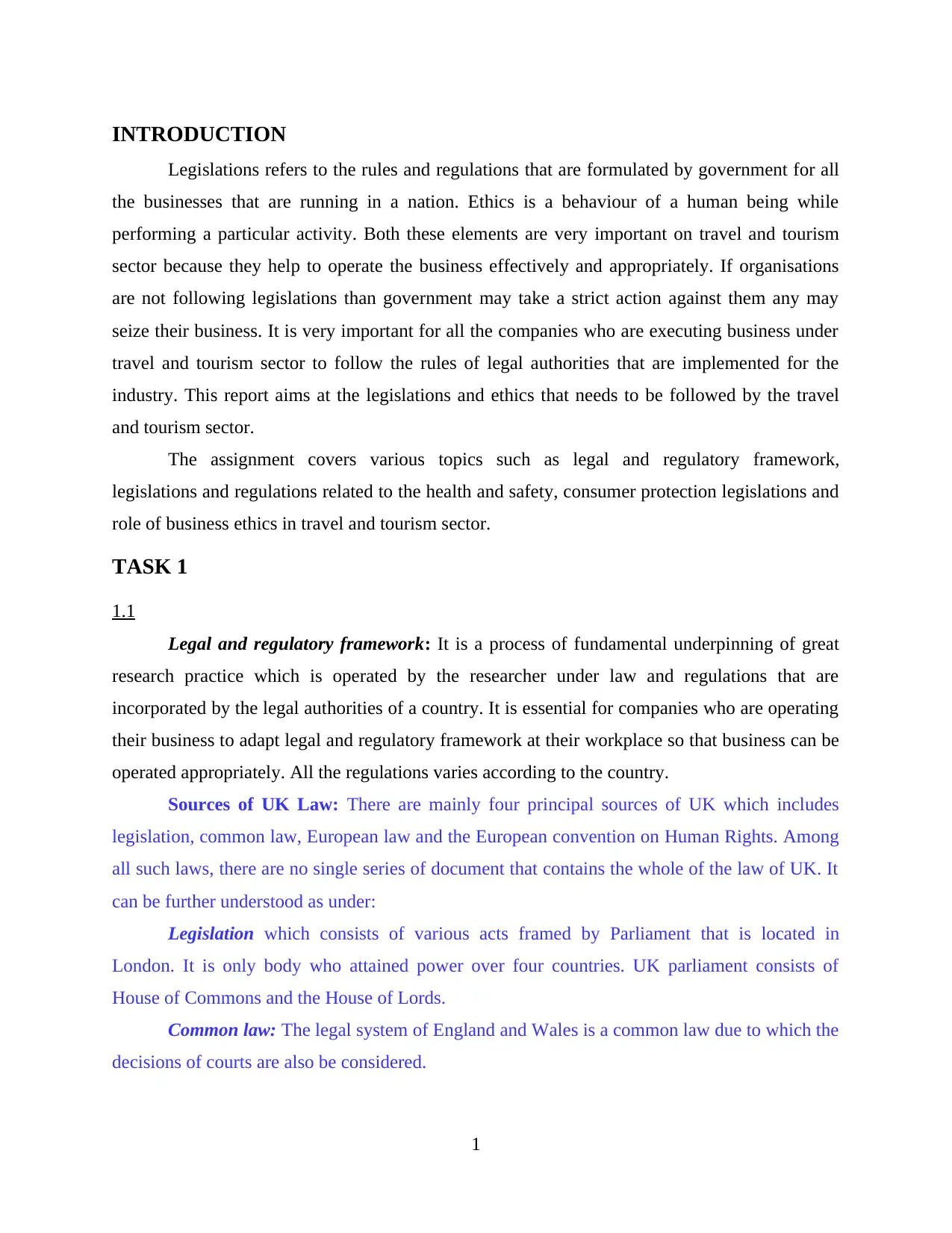
INTRODUCTION
Legislations refers to the rules and regulations that are formulated by government for all
the businesses that are running in a nation. Ethics is a behaviour of a human being while
performing a particular activity. Both these elements are very important on travel and tourism
sector because they help to operate the business effectively and appropriately. If organisations
are not following legislations than government may take a strict action against them any may
seize their business. It is very important for all the companies who are executing business under
travel and tourism sector to follow the rules of legal authorities that are implemented for the
industry. This report aims at the legislations and ethics that needs to be followed by the travel
and tourism sector.
The assignment covers various topics such as legal and regulatory framework,
legislations and regulations related to the health and safety, consumer protection legislations and
role of business ethics in travel and tourism sector.
TASK 1
1.1
Legal and regulatory framework: It is a process of fundamental underpinning of great
research practice which is operated by the researcher under law and regulations that are
incorporated by the legal authorities of a country. It is essential for companies who are operating
their business to adapt legal and regulatory framework at their workplace so that business can be
operated appropriately. All the regulations varies according to the country.
Sources of UK Law: There are mainly four principal sources of UK which includes
legislation, common law, European law and the European convention on Human Rights. Among
all such laws, there are no single series of document that contains the whole of the law of UK. It
can be further understood as under:
Legislation which consists of various acts framed by Parliament that is located in
London. It is only body who attained power over four countries. UK parliament consists of
House of Commons and the House of Lords.
Common law: The legal system of England and Wales is a common law due to which the
decisions of courts are also be considered.
1
Legislations refers to the rules and regulations that are formulated by government for all
the businesses that are running in a nation. Ethics is a behaviour of a human being while
performing a particular activity. Both these elements are very important on travel and tourism
sector because they help to operate the business effectively and appropriately. If organisations
are not following legislations than government may take a strict action against them any may
seize their business. It is very important for all the companies who are executing business under
travel and tourism sector to follow the rules of legal authorities that are implemented for the
industry. This report aims at the legislations and ethics that needs to be followed by the travel
and tourism sector.
The assignment covers various topics such as legal and regulatory framework,
legislations and regulations related to the health and safety, consumer protection legislations and
role of business ethics in travel and tourism sector.
TASK 1
1.1
Legal and regulatory framework: It is a process of fundamental underpinning of great
research practice which is operated by the researcher under law and regulations that are
incorporated by the legal authorities of a country. It is essential for companies who are operating
their business to adapt legal and regulatory framework at their workplace so that business can be
operated appropriately. All the regulations varies according to the country.
Sources of UK Law: There are mainly four principal sources of UK which includes
legislation, common law, European law and the European convention on Human Rights. Among
all such laws, there are no single series of document that contains the whole of the law of UK. It
can be further understood as under:
Legislation which consists of various acts framed by Parliament that is located in
London. It is only body who attained power over four countries. UK parliament consists of
House of Commons and the House of Lords.
Common law: The legal system of England and Wales is a common law due to which the
decisions of courts are also be considered.
1
⊘ This is a preview!⊘
Do you want full access?
Subscribe today to unlock all pages.

Trusted by 1+ million students worldwide
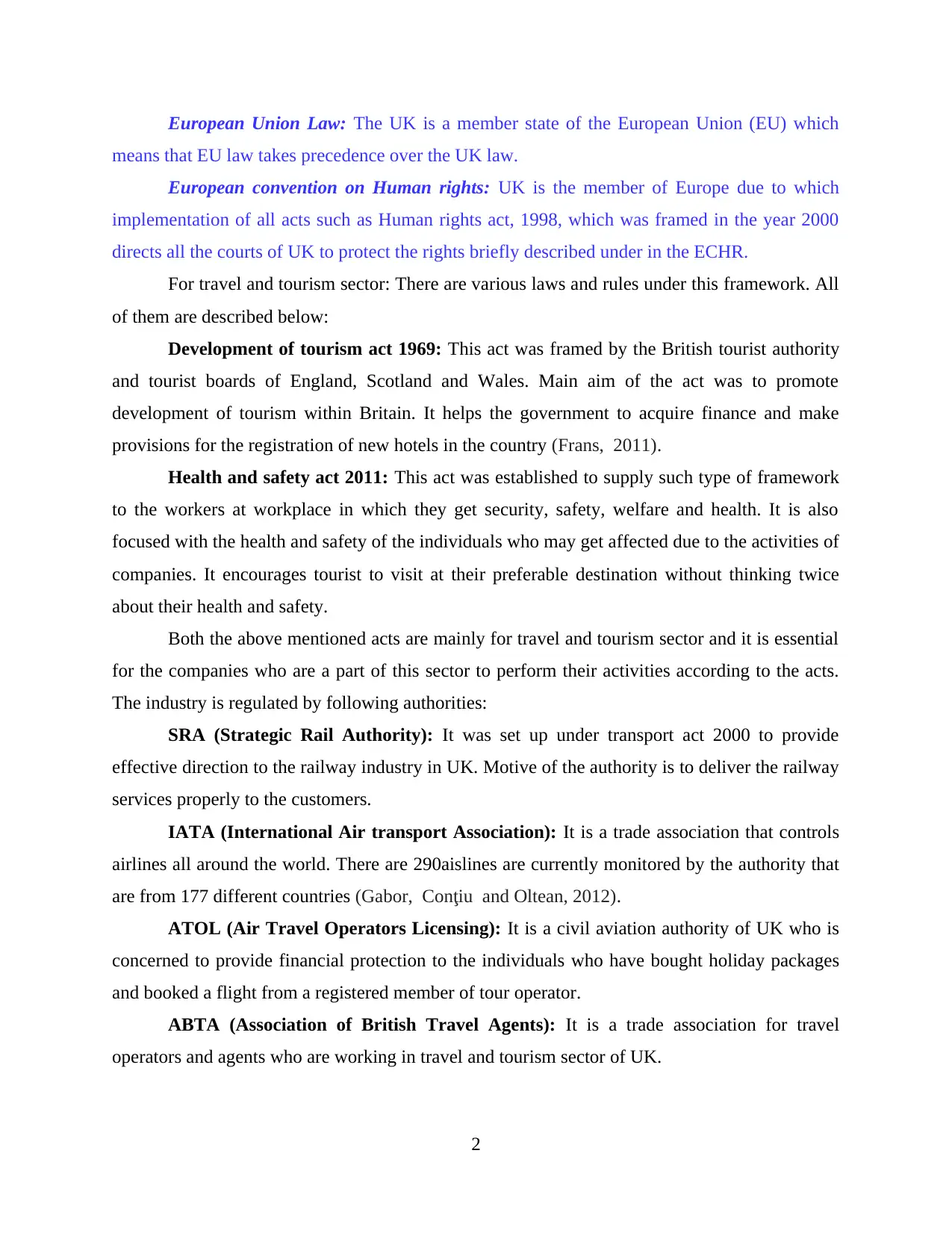
European Union Law: The UK is a member state of the European Union (EU) which
means that EU law takes precedence over the UK law.
European convention on Human rights: UK is the member of Europe due to which
implementation of all acts such as Human rights act, 1998, which was framed in the year 2000
directs all the courts of UK to protect the rights briefly described under in the ECHR.
For travel and tourism sector: There are various laws and rules under this framework. All
of them are described below:
Development of tourism act 1969: This act was framed by the British tourist authority
and tourist boards of England, Scotland and Wales. Main aim of the act was to promote
development of tourism within Britain. It helps the government to acquire finance and make
provisions for the registration of new hotels in the country (Frans, 2011).
Health and safety act 2011: This act was established to supply such type of framework
to the workers at workplace in which they get security, safety, welfare and health. It is also
focused with the health and safety of the individuals who may get affected due to the activities of
companies. It encourages tourist to visit at their preferable destination without thinking twice
about their health and safety.
Both the above mentioned acts are mainly for travel and tourism sector and it is essential
for the companies who are a part of this sector to perform their activities according to the acts.
The industry is regulated by following authorities:
SRA (Strategic Rail Authority): It was set up under transport act 2000 to provide
effective direction to the railway industry in UK. Motive of the authority is to deliver the railway
services properly to the customers.
IATA (International Air transport Association): It is a trade association that controls
airlines all around the world. There are 290aislines are currently monitored by the authority that
are from 177 different countries (Gabor, Conţiu and Oltean, 2012).
ATOL (Air Travel Operators Licensing): It is a civil aviation authority of UK who is
concerned to provide financial protection to the individuals who have bought holiday packages
and booked a flight from a registered member of tour operator.
ABTA (Association of British Travel Agents): It is a trade association for travel
operators and agents who are working in travel and tourism sector of UK.
2
means that EU law takes precedence over the UK law.
European convention on Human rights: UK is the member of Europe due to which
implementation of all acts such as Human rights act, 1998, which was framed in the year 2000
directs all the courts of UK to protect the rights briefly described under in the ECHR.
For travel and tourism sector: There are various laws and rules under this framework. All
of them are described below:
Development of tourism act 1969: This act was framed by the British tourist authority
and tourist boards of England, Scotland and Wales. Main aim of the act was to promote
development of tourism within Britain. It helps the government to acquire finance and make
provisions for the registration of new hotels in the country (Frans, 2011).
Health and safety act 2011: This act was established to supply such type of framework
to the workers at workplace in which they get security, safety, welfare and health. It is also
focused with the health and safety of the individuals who may get affected due to the activities of
companies. It encourages tourist to visit at their preferable destination without thinking twice
about their health and safety.
Both the above mentioned acts are mainly for travel and tourism sector and it is essential
for the companies who are a part of this sector to perform their activities according to the acts.
The industry is regulated by following authorities:
SRA (Strategic Rail Authority): It was set up under transport act 2000 to provide
effective direction to the railway industry in UK. Motive of the authority is to deliver the railway
services properly to the customers.
IATA (International Air transport Association): It is a trade association that controls
airlines all around the world. There are 290aislines are currently monitored by the authority that
are from 177 different countries (Gabor, Conţiu and Oltean, 2012).
ATOL (Air Travel Operators Licensing): It is a civil aviation authority of UK who is
concerned to provide financial protection to the individuals who have bought holiday packages
and booked a flight from a registered member of tour operator.
ABTA (Association of British Travel Agents): It is a trade association for travel
operators and agents who are working in travel and tourism sector of UK.
2
Paraphrase This Document
Need a fresh take? Get an instant paraphrase of this document with our AI Paraphraser
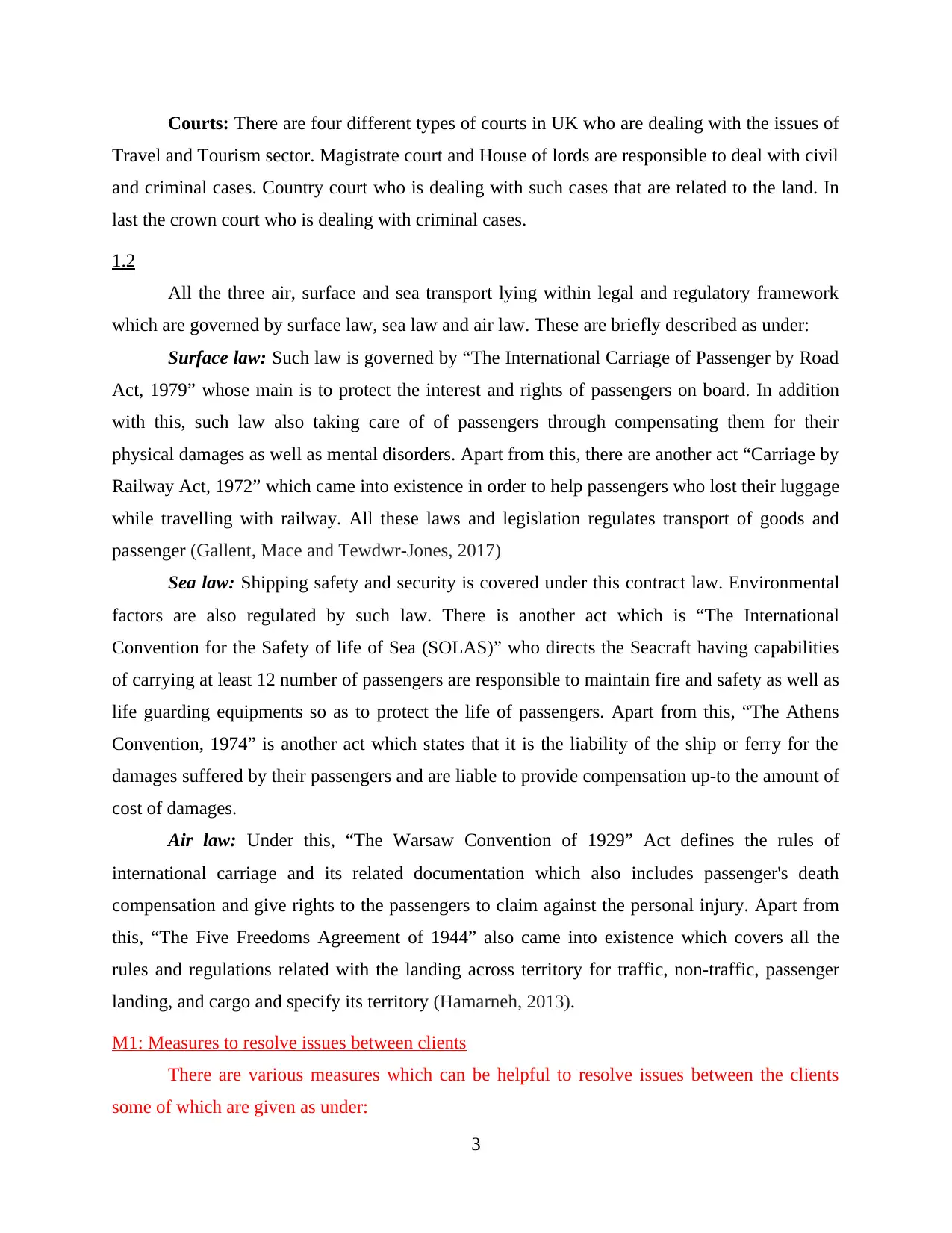
Courts: There are four different types of courts in UK who are dealing with the issues of
Travel and Tourism sector. Magistrate court and House of lords are responsible to deal with civil
and criminal cases. Country court who is dealing with such cases that are related to the land. In
last the crown court who is dealing with criminal cases.
1.2
All the three air, surface and sea transport lying within legal and regulatory framework
which are governed by surface law, sea law and air law. These are briefly described as under:
Surface law: Such law is governed by “The International Carriage of Passenger by Road
Act, 1979” whose main is to protect the interest and rights of passengers on board. In addition
with this, such law also taking care of of passengers through compensating them for their
physical damages as well as mental disorders. Apart from this, there are another act “Carriage by
Railway Act, 1972” which came into existence in order to help passengers who lost their luggage
while travelling with railway. All these laws and legislation regulates transport of goods and
passenger (Gallent, Mace and Tewdwr-Jones, 2017)
Sea law: Shipping safety and security is covered under this contract law. Environmental
factors are also regulated by such law. There is another act which is “The International
Convention for the Safety of life of Sea (SOLAS)” who directs the Seacraft having capabilities
of carrying at least 12 number of passengers are responsible to maintain fire and safety as well as
life guarding equipments so as to protect the life of passengers. Apart from this, “The Athens
Convention, 1974” is another act which states that it is the liability of the ship or ferry for the
damages suffered by their passengers and are liable to provide compensation up-to the amount of
cost of damages.
Air law: Under this, “The Warsaw Convention of 1929” Act defines the rules of
international carriage and its related documentation which also includes passenger's death
compensation and give rights to the passengers to claim against the personal injury. Apart from
this, “The Five Freedoms Agreement of 1944” also came into existence which covers all the
rules and regulations related with the landing across territory for traffic, non-traffic, passenger
landing, and cargo and specify its territory (Hamarneh, 2013).
M1: Measures to resolve issues between clients
There are various measures which can be helpful to resolve issues between the clients
some of which are given as under:
3
Travel and Tourism sector. Magistrate court and House of lords are responsible to deal with civil
and criminal cases. Country court who is dealing with such cases that are related to the land. In
last the crown court who is dealing with criminal cases.
1.2
All the three air, surface and sea transport lying within legal and regulatory framework
which are governed by surface law, sea law and air law. These are briefly described as under:
Surface law: Such law is governed by “The International Carriage of Passenger by Road
Act, 1979” whose main is to protect the interest and rights of passengers on board. In addition
with this, such law also taking care of of passengers through compensating them for their
physical damages as well as mental disorders. Apart from this, there are another act “Carriage by
Railway Act, 1972” which came into existence in order to help passengers who lost their luggage
while travelling with railway. All these laws and legislation regulates transport of goods and
passenger (Gallent, Mace and Tewdwr-Jones, 2017)
Sea law: Shipping safety and security is covered under this contract law. Environmental
factors are also regulated by such law. There is another act which is “The International
Convention for the Safety of life of Sea (SOLAS)” who directs the Seacraft having capabilities
of carrying at least 12 number of passengers are responsible to maintain fire and safety as well as
life guarding equipments so as to protect the life of passengers. Apart from this, “The Athens
Convention, 1974” is another act which states that it is the liability of the ship or ferry for the
damages suffered by their passengers and are liable to provide compensation up-to the amount of
cost of damages.
Air law: Under this, “The Warsaw Convention of 1929” Act defines the rules of
international carriage and its related documentation which also includes passenger's death
compensation and give rights to the passengers to claim against the personal injury. Apart from
this, “The Five Freedoms Agreement of 1944” also came into existence which covers all the
rules and regulations related with the landing across territory for traffic, non-traffic, passenger
landing, and cargo and specify its territory (Hamarneh, 2013).
M1: Measures to resolve issues between clients
There are various measures which can be helpful to resolve issues between the clients
some of which are given as under:
3
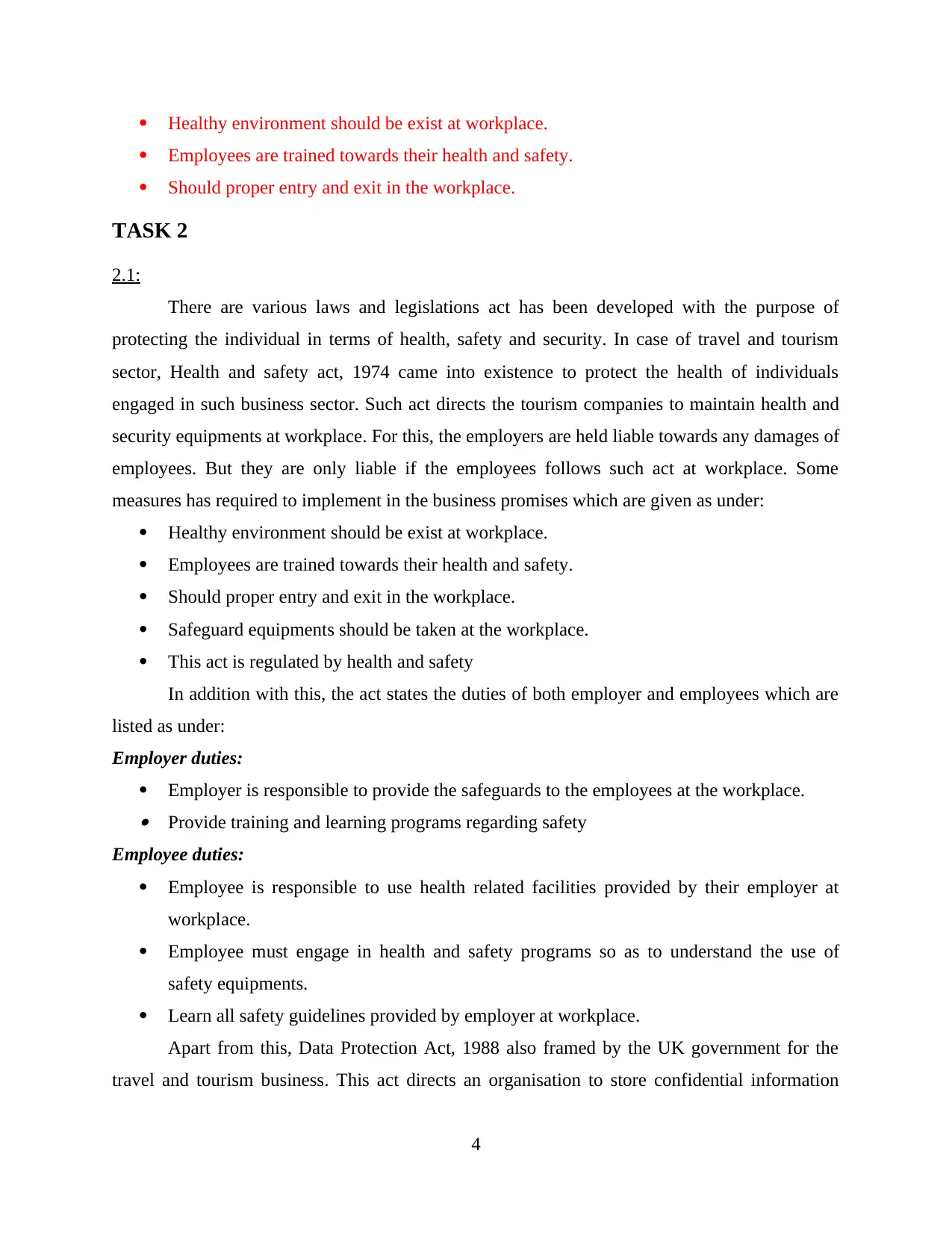
Healthy environment should be exist at workplace.
Employees are trained towards their health and safety.
Should proper entry and exit in the workplace.
TASK 2
2.1:
There are various laws and legislations act has been developed with the purpose of
protecting the individual in terms of health, safety and security. In case of travel and tourism
sector, Health and safety act, 1974 came into existence to protect the health of individuals
engaged in such business sector. Such act directs the tourism companies to maintain health and
security equipments at workplace. For this, the employers are held liable towards any damages of
employees. But they are only liable if the employees follows such act at workplace. Some
measures has required to implement in the business promises which are given as under:
Healthy environment should be exist at workplace.
Employees are trained towards their health and safety.
Should proper entry and exit in the workplace.
Safeguard equipments should be taken at the workplace.
This act is regulated by health and safety
In addition with this, the act states the duties of both employer and employees which are
listed as under:
Employer duties:
Employer is responsible to provide the safeguards to the employees at the workplace. Provide training and learning programs regarding safety
Employee duties:
Employee is responsible to use health related facilities provided by their employer at
workplace.
Employee must engage in health and safety programs so as to understand the use of
safety equipments.
Learn all safety guidelines provided by employer at workplace.
Apart from this, Data Protection Act, 1988 also framed by the UK government for the
travel and tourism business. This act directs an organisation to store confidential information
4
Employees are trained towards their health and safety.
Should proper entry and exit in the workplace.
TASK 2
2.1:
There are various laws and legislations act has been developed with the purpose of
protecting the individual in terms of health, safety and security. In case of travel and tourism
sector, Health and safety act, 1974 came into existence to protect the health of individuals
engaged in such business sector. Such act directs the tourism companies to maintain health and
security equipments at workplace. For this, the employers are held liable towards any damages of
employees. But they are only liable if the employees follows such act at workplace. Some
measures has required to implement in the business promises which are given as under:
Healthy environment should be exist at workplace.
Employees are trained towards their health and safety.
Should proper entry and exit in the workplace.
Safeguard equipments should be taken at the workplace.
This act is regulated by health and safety
In addition with this, the act states the duties of both employer and employees which are
listed as under:
Employer duties:
Employer is responsible to provide the safeguards to the employees at the workplace. Provide training and learning programs regarding safety
Employee duties:
Employee is responsible to use health related facilities provided by their employer at
workplace.
Employee must engage in health and safety programs so as to understand the use of
safety equipments.
Learn all safety guidelines provided by employer at workplace.
Apart from this, Data Protection Act, 1988 also framed by the UK government for the
travel and tourism business. This act directs an organisation to store confidential information
4
⊘ This is a preview!⊘
Do you want full access?
Subscribe today to unlock all pages.

Trusted by 1+ million students worldwide
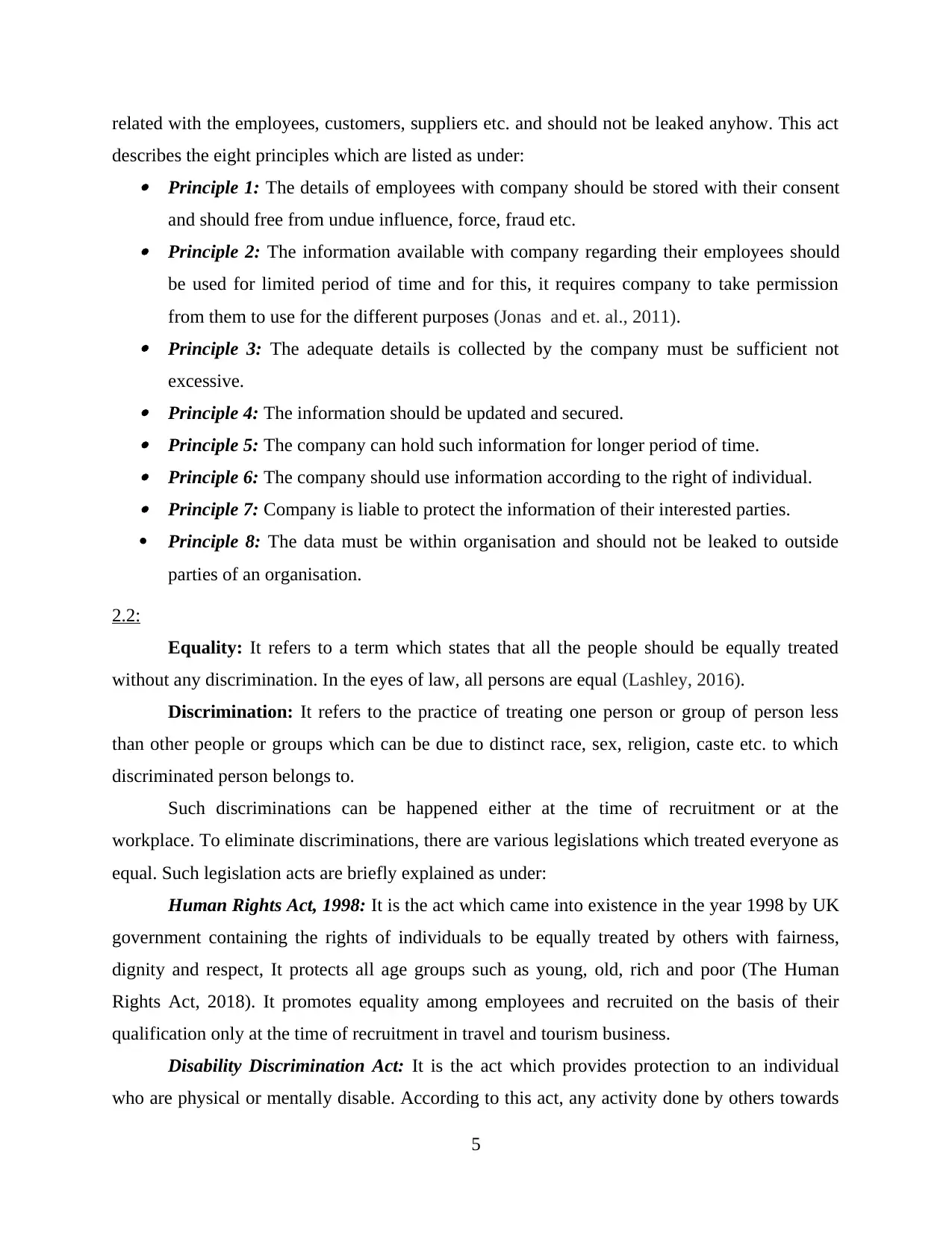
related with the employees, customers, suppliers etc. and should not be leaked anyhow. This act
describes the eight principles which are listed as under: Principle 1: The details of employees with company should be stored with their consent
and should free from undue influence, force, fraud etc. Principle 2: The information available with company regarding their employees should
be used for limited period of time and for this, it requires company to take permission
from them to use for the different purposes (Jonas and et. al., 2011). Principle 3: The adequate details is collected by the company must be sufficient not
excessive. Principle 4: The information should be updated and secured. Principle 5: The company can hold such information for longer period of time. Principle 6: The company should use information according to the right of individual. Principle 7: Company is liable to protect the information of their interested parties.
Principle 8: The data must be within organisation and should not be leaked to outside
parties of an organisation.
2.2:
Equality: It refers to a term which states that all the people should be equally treated
without any discrimination. In the eyes of law, all persons are equal (Lashley, 2016).
Discrimination: It refers to the practice of treating one person or group of person less
than other people or groups which can be due to distinct race, sex, religion, caste etc. to which
discriminated person belongs to.
Such discriminations can be happened either at the time of recruitment or at the
workplace. To eliminate discriminations, there are various legislations which treated everyone as
equal. Such legislation acts are briefly explained as under:
Human Rights Act, 1998: It is the act which came into existence in the year 1998 by UK
government containing the rights of individuals to be equally treated by others with fairness,
dignity and respect, It protects all age groups such as young, old, rich and poor (The Human
Rights Act, 2018). It promotes equality among employees and recruited on the basis of their
qualification only at the time of recruitment in travel and tourism business.
Disability Discrimination Act: It is the act which provides protection to an individual
who are physical or mentally disable. According to this act, any activity done by others towards
5
describes the eight principles which are listed as under: Principle 1: The details of employees with company should be stored with their consent
and should free from undue influence, force, fraud etc. Principle 2: The information available with company regarding their employees should
be used for limited period of time and for this, it requires company to take permission
from them to use for the different purposes (Jonas and et. al., 2011). Principle 3: The adequate details is collected by the company must be sufficient not
excessive. Principle 4: The information should be updated and secured. Principle 5: The company can hold such information for longer period of time. Principle 6: The company should use information according to the right of individual. Principle 7: Company is liable to protect the information of their interested parties.
Principle 8: The data must be within organisation and should not be leaked to outside
parties of an organisation.
2.2:
Equality: It refers to a term which states that all the people should be equally treated
without any discrimination. In the eyes of law, all persons are equal (Lashley, 2016).
Discrimination: It refers to the practice of treating one person or group of person less
than other people or groups which can be due to distinct race, sex, religion, caste etc. to which
discriminated person belongs to.
Such discriminations can be happened either at the time of recruitment or at the
workplace. To eliminate discriminations, there are various legislations which treated everyone as
equal. Such legislation acts are briefly explained as under:
Human Rights Act, 1998: It is the act which came into existence in the year 1998 by UK
government containing the rights of individuals to be equally treated by others with fairness,
dignity and respect, It protects all age groups such as young, old, rich and poor (The Human
Rights Act, 2018). It promotes equality among employees and recruited on the basis of their
qualification only at the time of recruitment in travel and tourism business.
Disability Discrimination Act: It is the act which provides protection to an individual
who are physical or mentally disable. According to this act, any activity done by others towards
5
Paraphrase This Document
Need a fresh take? Get an instant paraphrase of this document with our AI Paraphraser
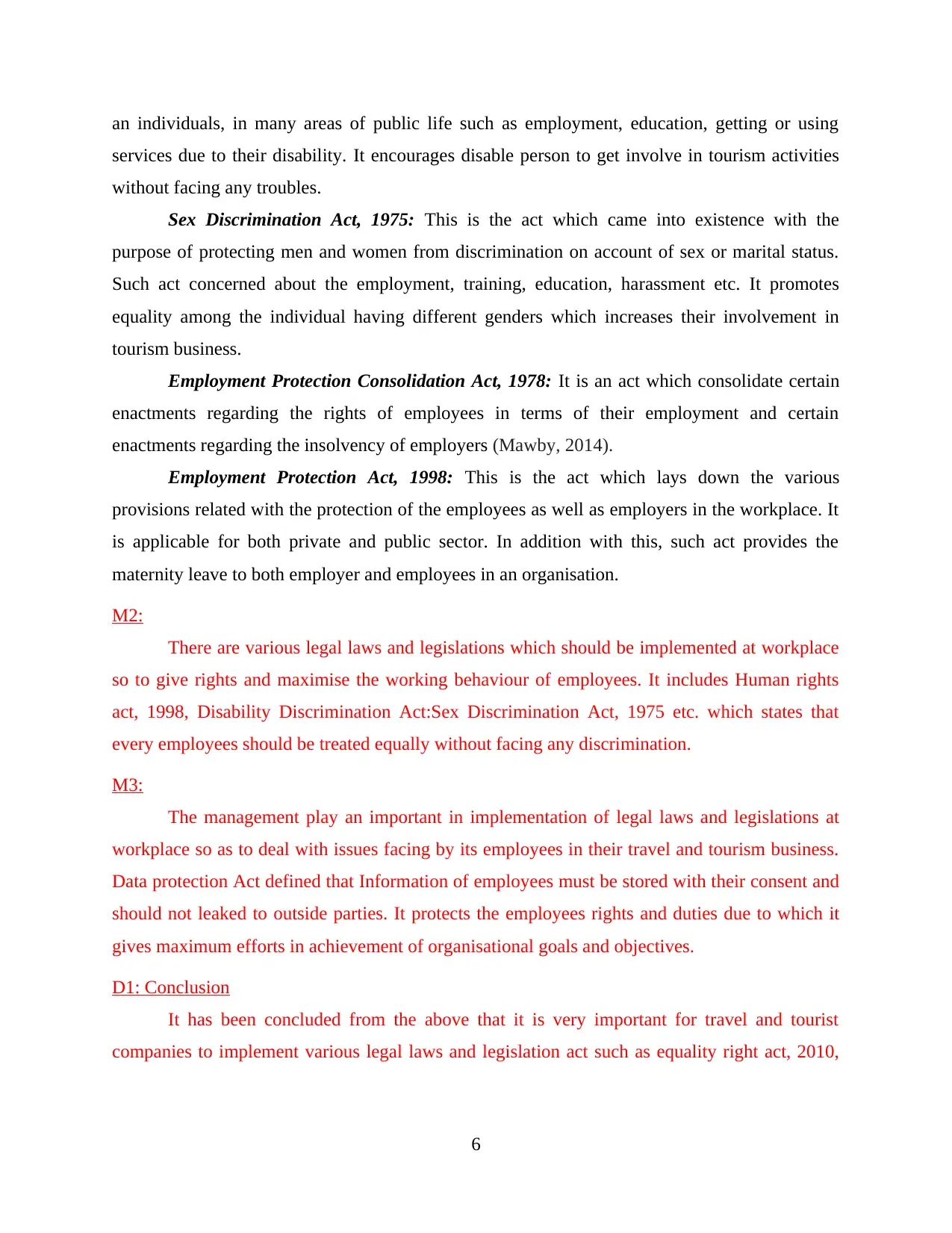
an individuals, in many areas of public life such as employment, education, getting or using
services due to their disability. It encourages disable person to get involve in tourism activities
without facing any troubles.
Sex Discrimination Act, 1975: This is the act which came into existence with the
purpose of protecting men and women from discrimination on account of sex or marital status.
Such act concerned about the employment, training, education, harassment etc. It promotes
equality among the individual having different genders which increases their involvement in
tourism business.
Employment Protection Consolidation Act, 1978: It is an act which consolidate certain
enactments regarding the rights of employees in terms of their employment and certain
enactments regarding the insolvency of employers (Mawby, 2014).
Employment Protection Act, 1998: This is the act which lays down the various
provisions related with the protection of the employees as well as employers in the workplace. It
is applicable for both private and public sector. In addition with this, such act provides the
maternity leave to both employer and employees in an organisation.
M2:
There are various legal laws and legislations which should be implemented at workplace
so to give rights and maximise the working behaviour of employees. It includes Human rights
act, 1998, Disability Discrimination Act:Sex Discrimination Act, 1975 etc. which states that
every employees should be treated equally without facing any discrimination.
M3:
The management play an important in implementation of legal laws and legislations at
workplace so as to deal with issues facing by its employees in their travel and tourism business.
Data protection Act defined that Information of employees must be stored with their consent and
should not leaked to outside parties. It protects the employees rights and duties due to which it
gives maximum efforts in achievement of organisational goals and objectives.
D1: Conclusion
It has been concluded from the above that it is very important for travel and tourist
companies to implement various legal laws and legislation act such as equality right act, 2010,
6
services due to their disability. It encourages disable person to get involve in tourism activities
without facing any troubles.
Sex Discrimination Act, 1975: This is the act which came into existence with the
purpose of protecting men and women from discrimination on account of sex or marital status.
Such act concerned about the employment, training, education, harassment etc. It promotes
equality among the individual having different genders which increases their involvement in
tourism business.
Employment Protection Consolidation Act, 1978: It is an act which consolidate certain
enactments regarding the rights of employees in terms of their employment and certain
enactments regarding the insolvency of employers (Mawby, 2014).
Employment Protection Act, 1998: This is the act which lays down the various
provisions related with the protection of the employees as well as employers in the workplace. It
is applicable for both private and public sector. In addition with this, such act provides the
maternity leave to both employer and employees in an organisation.
M2:
There are various legal laws and legislations which should be implemented at workplace
so to give rights and maximise the working behaviour of employees. It includes Human rights
act, 1998, Disability Discrimination Act:Sex Discrimination Act, 1975 etc. which states that
every employees should be treated equally without facing any discrimination.
M3:
The management play an important in implementation of legal laws and legislations at
workplace so as to deal with issues facing by its employees in their travel and tourism business.
Data protection Act defined that Information of employees must be stored with their consent and
should not leaked to outside parties. It protects the employees rights and duties due to which it
gives maximum efforts in achievement of organisational goals and objectives.
D1: Conclusion
It has been concluded from the above that it is very important for travel and tourist
companies to implement various legal laws and legislation act such as equality right act, 2010,
6
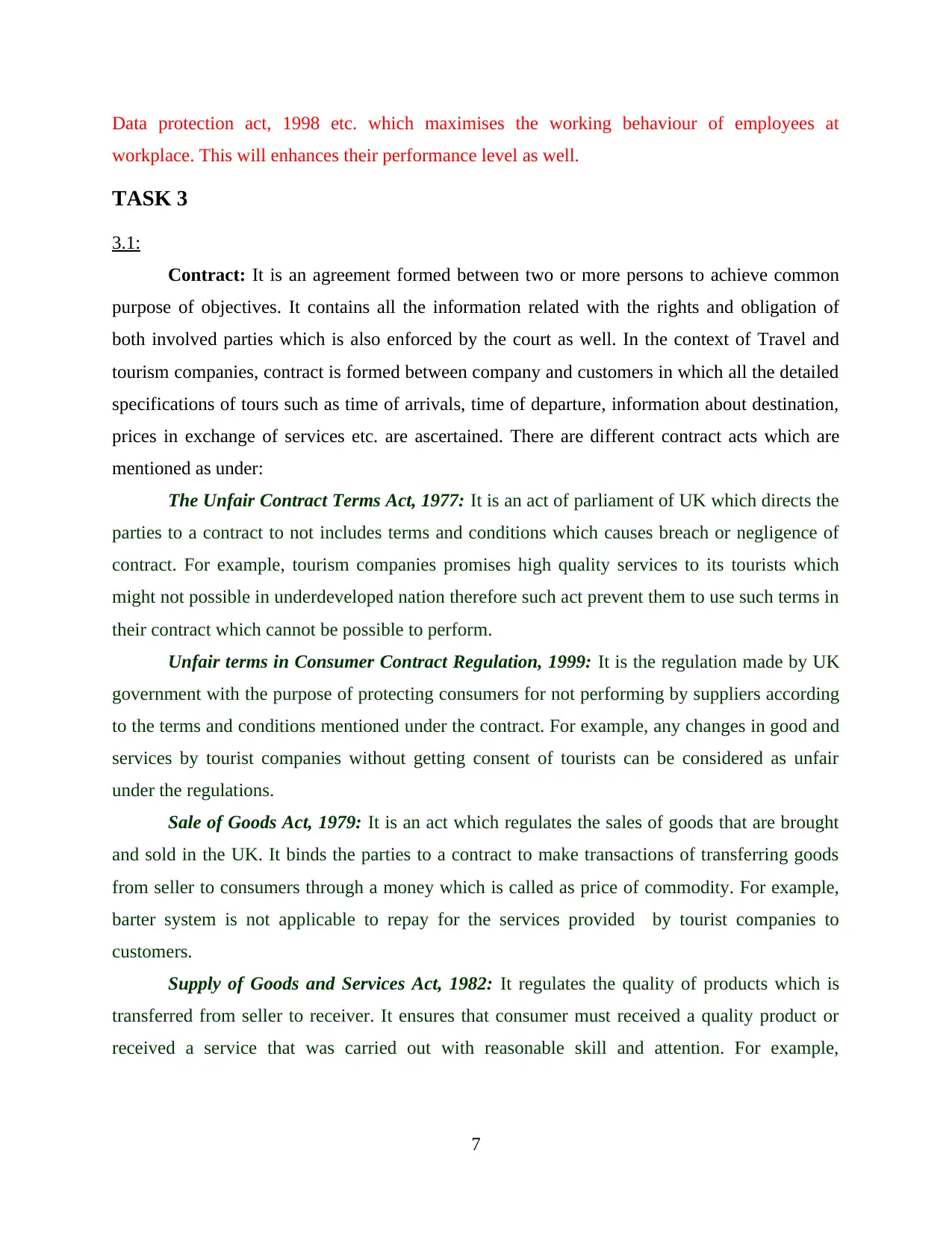
Data protection act, 1998 etc. which maximises the working behaviour of employees at
workplace. This will enhances their performance level as well.
TASK 3
3.1:
Contract: It is an agreement formed between two or more persons to achieve common
purpose of objectives. It contains all the information related with the rights and obligation of
both involved parties which is also enforced by the court as well. In the context of Travel and
tourism companies, contract is formed between company and customers in which all the detailed
specifications of tours such as time of arrivals, time of departure, information about destination,
prices in exchange of services etc. are ascertained. There are different contract acts which are
mentioned as under:
The Unfair Contract Terms Act, 1977: It is an act of parliament of UK which directs the
parties to a contract to not includes terms and conditions which causes breach or negligence of
contract. For example, tourism companies promises high quality services to its tourists which
might not possible in underdeveloped nation therefore such act prevent them to use such terms in
their contract which cannot be possible to perform.
Unfair terms in Consumer Contract Regulation, 1999: It is the regulation made by UK
government with the purpose of protecting consumers for not performing by suppliers according
to the terms and conditions mentioned under the contract. For example, any changes in good and
services by tourist companies without getting consent of tourists can be considered as unfair
under the regulations.
Sale of Goods Act, 1979: It is an act which regulates the sales of goods that are brought
and sold in the UK. It binds the parties to a contract to make transactions of transferring goods
from seller to consumers through a money which is called as price of commodity. For example,
barter system is not applicable to repay for the services provided by tourist companies to
customers.
Supply of Goods and Services Act, 1982: It regulates the quality of products which is
transferred from seller to receiver. It ensures that consumer must received a quality product or
received a service that was carried out with reasonable skill and attention. For example,
7
workplace. This will enhances their performance level as well.
TASK 3
3.1:
Contract: It is an agreement formed between two or more persons to achieve common
purpose of objectives. It contains all the information related with the rights and obligation of
both involved parties which is also enforced by the court as well. In the context of Travel and
tourism companies, contract is formed between company and customers in which all the detailed
specifications of tours such as time of arrivals, time of departure, information about destination,
prices in exchange of services etc. are ascertained. There are different contract acts which are
mentioned as under:
The Unfair Contract Terms Act, 1977: It is an act of parliament of UK which directs the
parties to a contract to not includes terms and conditions which causes breach or negligence of
contract. For example, tourism companies promises high quality services to its tourists which
might not possible in underdeveloped nation therefore such act prevent them to use such terms in
their contract which cannot be possible to perform.
Unfair terms in Consumer Contract Regulation, 1999: It is the regulation made by UK
government with the purpose of protecting consumers for not performing by suppliers according
to the terms and conditions mentioned under the contract. For example, any changes in good and
services by tourist companies without getting consent of tourists can be considered as unfair
under the regulations.
Sale of Goods Act, 1979: It is an act which regulates the sales of goods that are brought
and sold in the UK. It binds the parties to a contract to make transactions of transferring goods
from seller to consumers through a money which is called as price of commodity. For example,
barter system is not applicable to repay for the services provided by tourist companies to
customers.
Supply of Goods and Services Act, 1982: It regulates the quality of products which is
transferred from seller to receiver. It ensures that consumer must received a quality product or
received a service that was carried out with reasonable skill and attention. For example,
7
⊘ This is a preview!⊘
Do you want full access?
Subscribe today to unlock all pages.

Trusted by 1+ million students worldwide
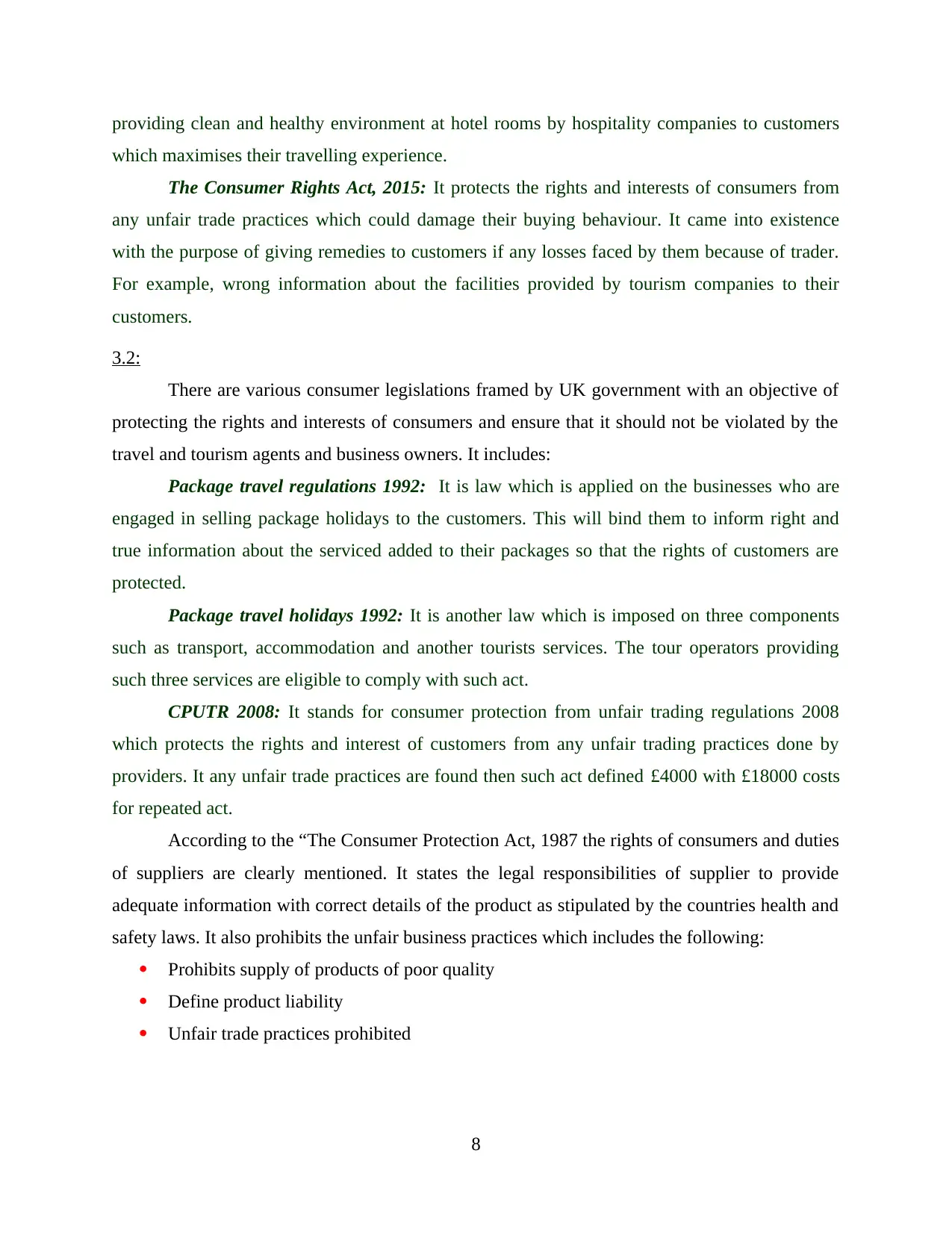
providing clean and healthy environment at hotel rooms by hospitality companies to customers
which maximises their travelling experience.
The Consumer Rights Act, 2015: It protects the rights and interests of consumers from
any unfair trade practices which could damage their buying behaviour. It came into existence
with the purpose of giving remedies to customers if any losses faced by them because of trader.
For example, wrong information about the facilities provided by tourism companies to their
customers.
3.2:
There are various consumer legislations framed by UK government with an objective of
protecting the rights and interests of consumers and ensure that it should not be violated by the
travel and tourism agents and business owners. It includes:
Package travel regulations 1992: It is law which is applied on the businesses who are
engaged in selling package holidays to the customers. This will bind them to inform right and
true information about the serviced added to their packages so that the rights of customers are
protected.
Package travel holidays 1992: It is another law which is imposed on three components
such as transport, accommodation and another tourists services. The tour operators providing
such three services are eligible to comply with such act.
CPUTR 2008: It stands for consumer protection from unfair trading regulations 2008
which protects the rights and interest of customers from any unfair trading practices done by
providers. It any unfair trade practices are found then such act defined £4000 with £18000 costs
for repeated act.
According to the “The Consumer Protection Act, 1987 the rights of consumers and duties
of suppliers are clearly mentioned. It states the legal responsibilities of supplier to provide
adequate information with correct details of the product as stipulated by the countries health and
safety laws. It also prohibits the unfair business practices which includes the following:
Prohibits supply of products of poor quality
Define product liability
Unfair trade practices prohibited
8
which maximises their travelling experience.
The Consumer Rights Act, 2015: It protects the rights and interests of consumers from
any unfair trade practices which could damage their buying behaviour. It came into existence
with the purpose of giving remedies to customers if any losses faced by them because of trader.
For example, wrong information about the facilities provided by tourism companies to their
customers.
3.2:
There are various consumer legislations framed by UK government with an objective of
protecting the rights and interests of consumers and ensure that it should not be violated by the
travel and tourism agents and business owners. It includes:
Package travel regulations 1992: It is law which is applied on the businesses who are
engaged in selling package holidays to the customers. This will bind them to inform right and
true information about the serviced added to their packages so that the rights of customers are
protected.
Package travel holidays 1992: It is another law which is imposed on three components
such as transport, accommodation and another tourists services. The tour operators providing
such three services are eligible to comply with such act.
CPUTR 2008: It stands for consumer protection from unfair trading regulations 2008
which protects the rights and interest of customers from any unfair trading practices done by
providers. It any unfair trade practices are found then such act defined £4000 with £18000 costs
for repeated act.
According to the “The Consumer Protection Act, 1987 the rights of consumers and duties
of suppliers are clearly mentioned. It states the legal responsibilities of supplier to provide
adequate information with correct details of the product as stipulated by the countries health and
safety laws. It also prohibits the unfair business practices which includes the following:
Prohibits supply of products of poor quality
Define product liability
Unfair trade practices prohibited
8
Paraphrase This Document
Need a fresh take? Get an instant paraphrase of this document with our AI Paraphraser
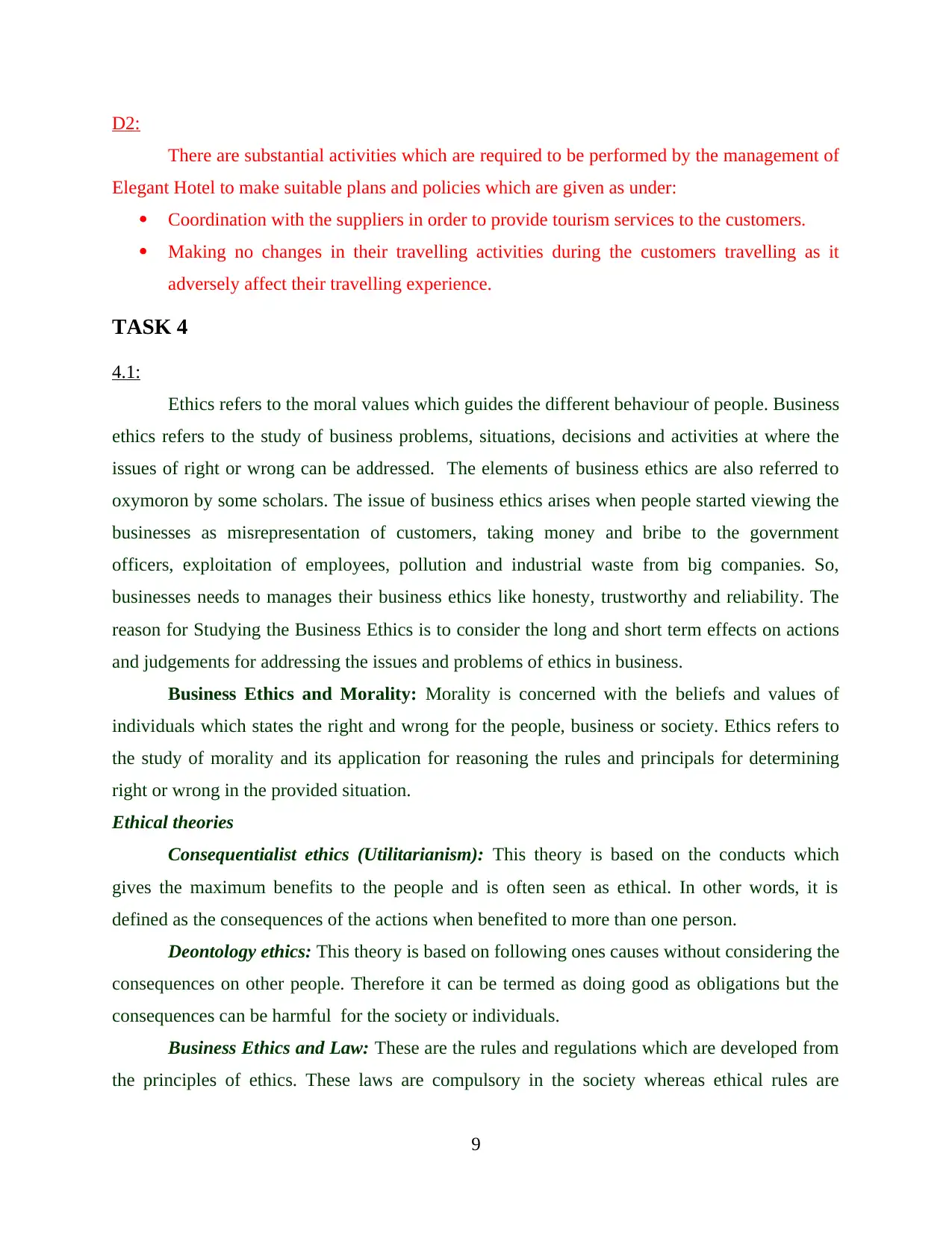
D2:
There are substantial activities which are required to be performed by the management of
Elegant Hotel to make suitable plans and policies which are given as under:
Coordination with the suppliers in order to provide tourism services to the customers.
Making no changes in their travelling activities during the customers travelling as it
adversely affect their travelling experience.
TASK 4
4.1:
Ethics refers to the moral values which guides the different behaviour of people. Business
ethics refers to the study of business problems, situations, decisions and activities at where the
issues of right or wrong can be addressed. The elements of business ethics are also referred to
oxymoron by some scholars. The issue of business ethics arises when people started viewing the
businesses as misrepresentation of customers, taking money and bribe to the government
officers, exploitation of employees, pollution and industrial waste from big companies. So,
businesses needs to manages their business ethics like honesty, trustworthy and reliability. The
reason for Studying the Business Ethics is to consider the long and short term effects on actions
and judgements for addressing the issues and problems of ethics in business.
Business Ethics and Morality: Morality is concerned with the beliefs and values of
individuals which states the right and wrong for the people, business or society. Ethics refers to
the study of morality and its application for reasoning the rules and principals for determining
right or wrong in the provided situation.
Ethical theories
Consequentialist ethics (Utilitarianism): This theory is based on the conducts which
gives the maximum benefits to the people and is often seen as ethical. In other words, it is
defined as the consequences of the actions when benefited to more than one person.
Deontology ethics: This theory is based on following ones causes without considering the
consequences on other people. Therefore it can be termed as doing good as obligations but the
consequences can be harmful for the society or individuals.
Business Ethics and Law: These are the rules and regulations which are developed from
the principles of ethics. These laws are compulsory in the society whereas ethical rules are
9
There are substantial activities which are required to be performed by the management of
Elegant Hotel to make suitable plans and policies which are given as under:
Coordination with the suppliers in order to provide tourism services to the customers.
Making no changes in their travelling activities during the customers travelling as it
adversely affect their travelling experience.
TASK 4
4.1:
Ethics refers to the moral values which guides the different behaviour of people. Business
ethics refers to the study of business problems, situations, decisions and activities at where the
issues of right or wrong can be addressed. The elements of business ethics are also referred to
oxymoron by some scholars. The issue of business ethics arises when people started viewing the
businesses as misrepresentation of customers, taking money and bribe to the government
officers, exploitation of employees, pollution and industrial waste from big companies. So,
businesses needs to manages their business ethics like honesty, trustworthy and reliability. The
reason for Studying the Business Ethics is to consider the long and short term effects on actions
and judgements for addressing the issues and problems of ethics in business.
Business Ethics and Morality: Morality is concerned with the beliefs and values of
individuals which states the right and wrong for the people, business or society. Ethics refers to
the study of morality and its application for reasoning the rules and principals for determining
right or wrong in the provided situation.
Ethical theories
Consequentialist ethics (Utilitarianism): This theory is based on the conducts which
gives the maximum benefits to the people and is often seen as ethical. In other words, it is
defined as the consequences of the actions when benefited to more than one person.
Deontology ethics: This theory is based on following ones causes without considering the
consequences on other people. Therefore it can be termed as doing good as obligations but the
consequences can be harmful for the society or individuals.
Business Ethics and Law: These are the rules and regulations which are developed from
the principles of ethics. These laws are compulsory in the society whereas ethical rules are
9
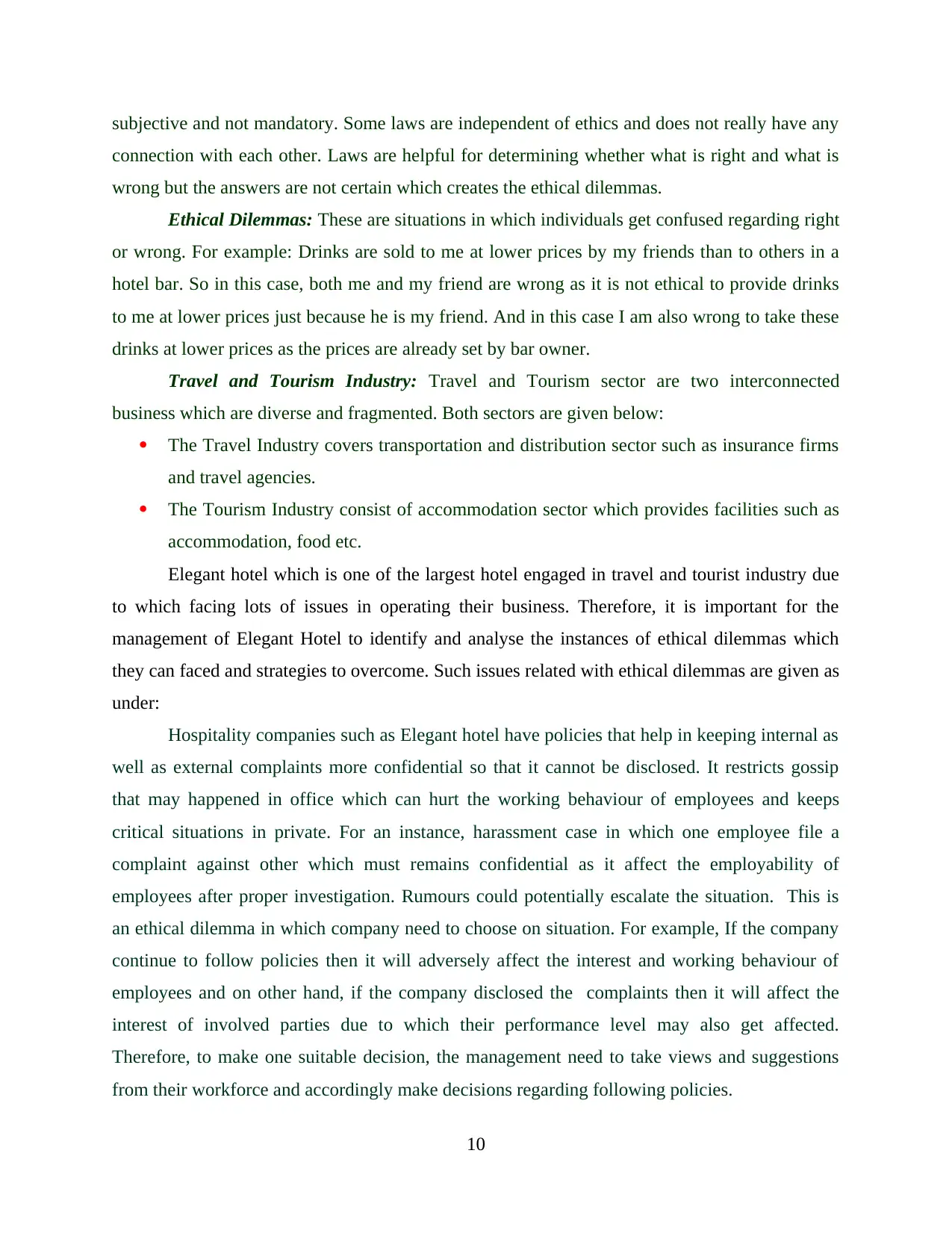
subjective and not mandatory. Some laws are independent of ethics and does not really have any
connection with each other. Laws are helpful for determining whether what is right and what is
wrong but the answers are not certain which creates the ethical dilemmas.
Ethical Dilemmas: These are situations in which individuals get confused regarding right
or wrong. For example: Drinks are sold to me at lower prices by my friends than to others in a
hotel bar. So in this case, both me and my friend are wrong as it is not ethical to provide drinks
to me at lower prices just because he is my friend. And in this case I am also wrong to take these
drinks at lower prices as the prices are already set by bar owner.
Travel and Tourism Industry: Travel and Tourism sector are two interconnected
business which are diverse and fragmented. Both sectors are given below:
The Travel Industry covers transportation and distribution sector such as insurance firms
and travel agencies.
The Tourism Industry consist of accommodation sector which provides facilities such as
accommodation, food etc.
Elegant hotel which is one of the largest hotel engaged in travel and tourist industry due
to which facing lots of issues in operating their business. Therefore, it is important for the
management of Elegant Hotel to identify and analyse the instances of ethical dilemmas which
they can faced and strategies to overcome. Such issues related with ethical dilemmas are given as
under:
Hospitality companies such as Elegant hotel have policies that help in keeping internal as
well as external complaints more confidential so that it cannot be disclosed. It restricts gossip
that may happened in office which can hurt the working behaviour of employees and keeps
critical situations in private. For an instance, harassment case in which one employee file a
complaint against other which must remains confidential as it affect the employability of
employees after proper investigation. Rumours could potentially escalate the situation. This is
an ethical dilemma in which company need to choose on situation. For example, If the company
continue to follow policies then it will adversely affect the interest and working behaviour of
employees and on other hand, if the company disclosed the complaints then it will affect the
interest of involved parties due to which their performance level may also get affected.
Therefore, to make one suitable decision, the management need to take views and suggestions
from their workforce and accordingly make decisions regarding following policies.
10
connection with each other. Laws are helpful for determining whether what is right and what is
wrong but the answers are not certain which creates the ethical dilemmas.
Ethical Dilemmas: These are situations in which individuals get confused regarding right
or wrong. For example: Drinks are sold to me at lower prices by my friends than to others in a
hotel bar. So in this case, both me and my friend are wrong as it is not ethical to provide drinks
to me at lower prices just because he is my friend. And in this case I am also wrong to take these
drinks at lower prices as the prices are already set by bar owner.
Travel and Tourism Industry: Travel and Tourism sector are two interconnected
business which are diverse and fragmented. Both sectors are given below:
The Travel Industry covers transportation and distribution sector such as insurance firms
and travel agencies.
The Tourism Industry consist of accommodation sector which provides facilities such as
accommodation, food etc.
Elegant hotel which is one of the largest hotel engaged in travel and tourist industry due
to which facing lots of issues in operating their business. Therefore, it is important for the
management of Elegant Hotel to identify and analyse the instances of ethical dilemmas which
they can faced and strategies to overcome. Such issues related with ethical dilemmas are given as
under:
Hospitality companies such as Elegant hotel have policies that help in keeping internal as
well as external complaints more confidential so that it cannot be disclosed. It restricts gossip
that may happened in office which can hurt the working behaviour of employees and keeps
critical situations in private. For an instance, harassment case in which one employee file a
complaint against other which must remains confidential as it affect the employability of
employees after proper investigation. Rumours could potentially escalate the situation. This is
an ethical dilemma in which company need to choose on situation. For example, If the company
continue to follow policies then it will adversely affect the interest and working behaviour of
employees and on other hand, if the company disclosed the complaints then it will affect the
interest of involved parties due to which their performance level may also get affected.
Therefore, to make one suitable decision, the management need to take views and suggestions
from their workforce and accordingly make decisions regarding following policies.
10
⊘ This is a preview!⊘
Do you want full access?
Subscribe today to unlock all pages.

Trusted by 1+ million students worldwide
1 out of 17
Related Documents
Your All-in-One AI-Powered Toolkit for Academic Success.
+13062052269
info@desklib.com
Available 24*7 on WhatsApp / Email
![[object Object]](/_next/static/media/star-bottom.7253800d.svg)
Unlock your academic potential
Copyright © 2020–2025 A2Z Services. All Rights Reserved. Developed and managed by ZUCOL.



